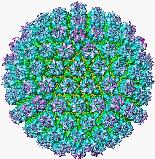
antiviral: any of a number of herbs, drugs, or agents capable of destroying viruses or inhibiting their growth or multiplication until the body is capable of destroying the virus itself
cold sores: a localized collection of clear fluid causing elevation of the skin and formation of a blister on the face, lips or inside the mouth
DNA polymerase: enzymes involved in template directed synthesis of DNA from deoxyribonucleotide triphosphates
ganglion: a group of nerve cell bodies clustered together in a uniform mass outside of, but often close to the brain or spinal chord
immunocompromised: a condition in which the immune system is not functioning normally because it was damaged by disease or medications
immunocompetent: patients able to develop an immune response
latency: the state of apparent inactivity during which time the herpes virus genetic material lies in a cell without producing virus-specific biochemical changes or evidence of reproduction or illness; latent virus is not detectable by the usual biochemical tests
lesions: tiny blisters grouped together on an inflamed base
primary herpes: a first infection with either HSV-1 or HSV-2 in a person who has never previously been infected with either form of the virus. Antiherpes, antibodies, and white cells are absent and overt disease may or may not develop.
recurrent herpes: repeated episodes of herpetic infectious blistering of the skin and mucous membrane due to reactivation of latent virus in the deep nerve ganglia which innervates that particular area of the body
thymidine kinase: a virally encoded enzyme that triggers the antiviral therapy to suppress the HSV infection
viral shedding: time at which the infectious herpes virus is released through the skin and transmission can occur to others